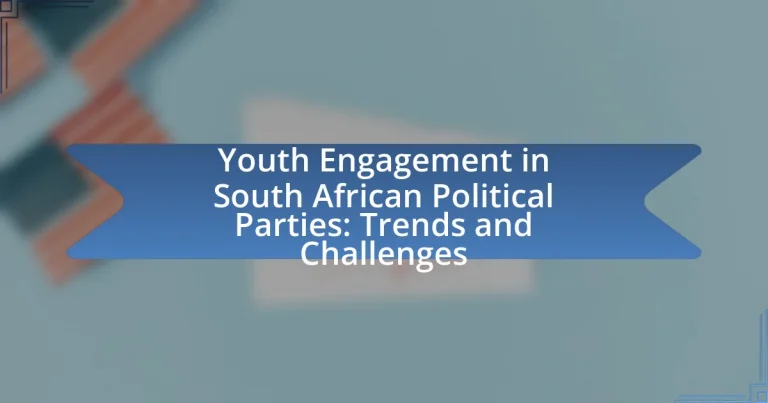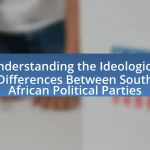Youth engagement in South African political parties refers to the active involvement of young individuals in political processes, decision-making, and party activities, which is essential given that approximately 35% of the population is aged 15 to 34. This article examines the significance of youth participation in shaping political discourse and influencing policy-making, highlighting current trends such as digital activism and the establishment of youth wings within political parties. It also addresses the challenges faced by political parties in engaging youth, including a lack of trust in institutions and socio-economic barriers. Furthermore, the article explores effective strategies for enhancing youth engagement, successful initiatives, and the future of youth involvement in South African politics.
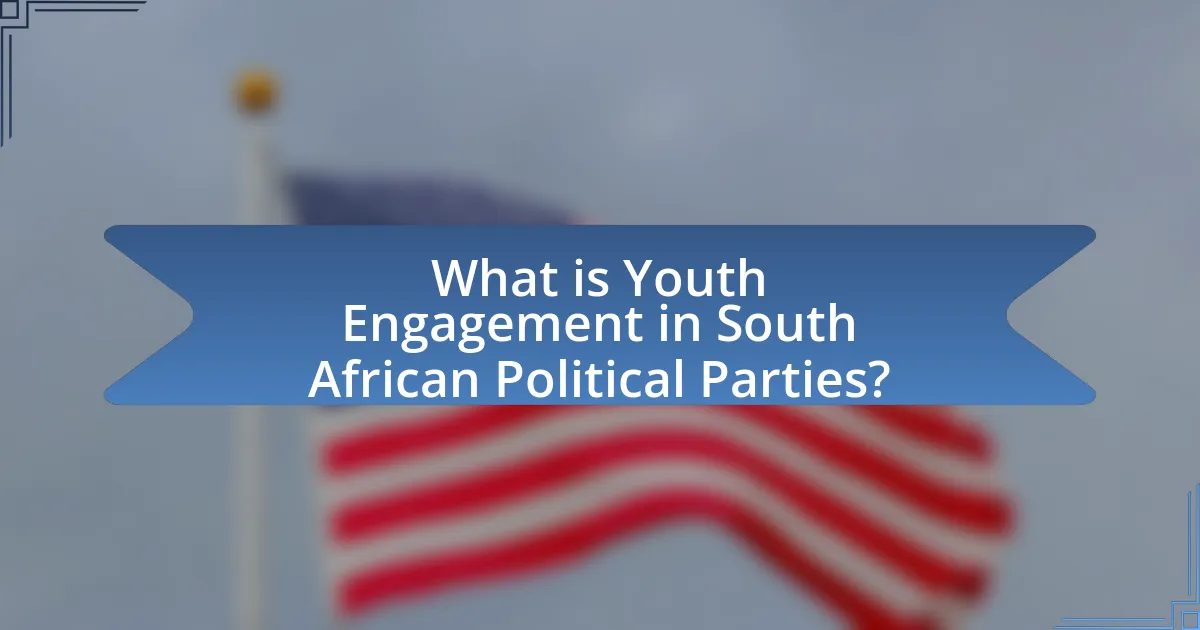
What is Youth Engagement in South African Political Parties?
Youth engagement in South African political parties refers to the active participation of young individuals in political processes, decision-making, and party activities. This engagement is crucial as it shapes the political landscape and influences policy-making that affects the youth demographic, which constitutes a significant portion of the population. According to the 2021 census, individuals aged 15 to 34 make up approximately 35% of South Africa’s population, highlighting the importance of their involvement in political discourse. Political parties in South Africa have recognized this demographic’s potential and have established youth wings to facilitate their participation, aiming to address issues such as unemployment, education, and social justice that resonate with younger voters.
Why is youth engagement important in the political landscape of South Africa?
Youth engagement is crucial in the political landscape of South Africa because it fosters democratic participation and addresses the unique needs of a significant demographic. Approximately 35% of South Africa’s population is aged between 15 and 34, making their involvement essential for shaping policies that reflect their interests and challenges. Engaging youth in politics can lead to increased voter turnout, as seen in the 2019 elections where youth participation rose by 5% compared to previous years. This engagement not only empowers young individuals but also ensures that political parties remain relevant and responsive to the evolving socio-economic landscape of the country.
What role does the youth play in shaping political discourse?
The youth play a crucial role in shaping political discourse by influencing policy discussions and mobilizing social movements. Their engagement often brings fresh perspectives and innovative ideas that challenge traditional political narratives. For instance, in South Africa, youth-led movements like #FeesMustFall have significantly impacted national conversations around education funding and access, demonstrating the power of young voices in advocating for change. Additionally, research from the Institute for Justice and Reconciliation highlights that youth participation in political processes can lead to increased accountability and responsiveness from political leaders, further underscoring their importance in shaping the political landscape.
How does youth engagement influence policy-making?
Youth engagement significantly influences policy-making by ensuring that the perspectives and needs of younger populations are represented in governmental decisions. Engaged youth can mobilize public opinion, advocate for specific issues, and participate in political processes, thereby shaping policies that address their concerns. For instance, in South Africa, youth-led movements have successfully pushed for policies related to education reform and job creation, reflecting their priorities and aspirations. This influence is evidenced by the increased inclusion of youth voices in policy discussions, as seen in initiatives like the National Youth Policy, which aims to integrate youth perspectives into national planning.
What are the current trends in youth engagement within South African political parties?
Current trends in youth engagement within South African political parties include increased digital activism, a focus on social justice issues, and the formation of youth wings within established parties. Digital platforms have become essential for mobilizing young voters, as seen in the rise of social media campaigns that address issues like unemployment and education. Additionally, youth wings, such as the African National Congress Youth League and the Economic Freedom Fighters’ Youth Command, are actively participating in policy discussions, reflecting a growing desire for representation and influence in political decision-making. These trends indicate a shift towards more dynamic and participatory forms of political engagement among South African youth.
How have political parties adapted to attract younger voters?
Political parties in South Africa have adapted to attract younger voters by leveraging digital platforms and focusing on issues that resonate with youth, such as education, employment, and social justice. For instance, parties have increased their presence on social media platforms like Twitter and Instagram, where younger demographics are most active, allowing for direct engagement and communication. Additionally, research from the Electoral Commission of South Africa indicates that parties that prioritize youth-centric policies and actively involve young people in decision-making processes tend to see higher levels of support from this demographic.
What platforms are most effective for engaging youth in politics?
Social media platforms, particularly Instagram, Twitter, and TikTok, are the most effective for engaging youth in politics. These platforms facilitate rapid information sharing and allow for interactive content, which resonates with younger audiences. For instance, a study by the Pew Research Center in 2021 found that 71% of young adults in South Africa use social media to discuss political issues, highlighting its role in political engagement. Additionally, campaigns that utilize visual storytelling and relatable content on these platforms have shown increased participation rates among youth in political activities.
What challenges do South African political parties face in engaging youth?
South African political parties face significant challenges in engaging youth, primarily due to a lack of trust in political institutions and a perception that parties do not address youth-specific issues. Research indicates that over 60% of young South Africans feel disconnected from political processes, as highlighted in the 2021 Youth Citizen Action Programme report. Additionally, political parties often struggle to communicate effectively through platforms that resonate with younger demographics, such as social media, leading to further disengagement. The combination of these factors results in a political landscape where youth participation remains low, hindering the ability of parties to mobilize this critical voter base.
What are the barriers to youth participation in political processes?
Barriers to youth participation in political processes include lack of access to information, limited political education, and socio-economic challenges. Research indicates that many young people in South Africa feel disconnected from political systems due to insufficient outreach and engagement efforts by political parties. According to a study by the Institute for Justice and Reconciliation, 60% of youth reported feeling uninformed about political issues, which hinders their ability to participate effectively. Additionally, socio-economic factors such as unemployment and poverty create obstacles, as young individuals often prioritize immediate economic needs over political involvement.
How do socio-economic factors impact youth engagement?
Socio-economic factors significantly impact youth engagement by influencing access to resources, opportunities, and participation in political processes. For instance, youth from lower socio-economic backgrounds often face barriers such as limited education, unemployment, and lack of access to information, which can hinder their ability to engage in political activities. Research indicates that in South Africa, youth unemployment rates are high, reaching approximately 63% among those aged 15-24, which directly correlates with lower levels of political participation and engagement in civic activities. Additionally, socio-economic disparities can lead to feelings of disenfranchisement and apathy towards political systems, further reducing youth involvement in political parties and movements.
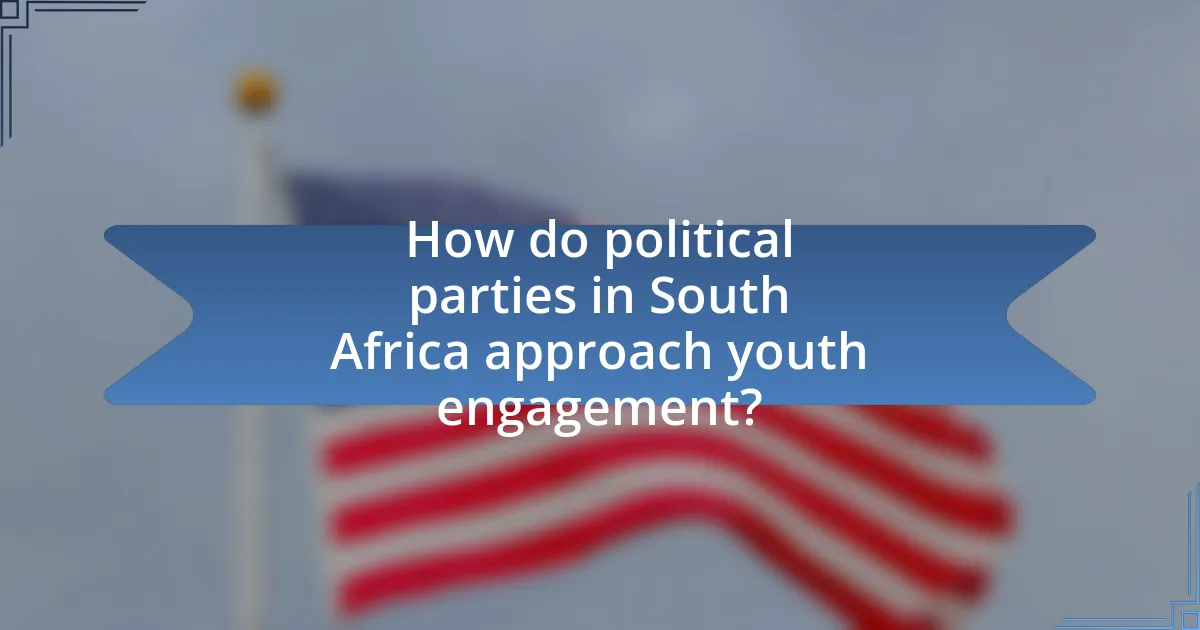
How do political parties in South Africa approach youth engagement?
Political parties in South Africa approach youth engagement through targeted initiatives, platforms, and policies aimed at addressing the interests and concerns of young people. For instance, the African National Congress (ANC) has established structures like the ANC Youth League to mobilize youth participation in politics, while the Democratic Alliance (DA) emphasizes youth representation in leadership roles and policy-making. Additionally, parties often utilize social media and digital campaigns to connect with younger voters, reflecting their preferences for modern communication methods. According to the 2021 South African Youth Survey, 63% of young South Africans expressed a desire for political parties to focus more on issues like education and employment, indicating that parties must align their engagement strategies with the priorities of the youth to be effective.
What strategies are employed by political parties to engage young voters?
Political parties employ various strategies to engage young voters, including leveraging social media platforms, organizing youth-focused events, and promoting policies that resonate with younger demographics. Social media is particularly effective, as studies show that over 90% of young South Africans use platforms like Facebook and Twitter, allowing parties to communicate directly and interactively. Additionally, events such as music festivals and community service initiatives attract young voters by creating a relatable and engaging atmosphere. Furthermore, political parties often highlight issues like education, unemployment, and climate change, which are significant concerns for the youth, thereby aligning their platforms with the interests of younger voters.
How effective are these strategies in mobilizing youth participation?
The strategies employed in mobilizing youth participation in South African political parties are moderately effective. Evidence from the 2021 South African Youth Survey indicates that targeted outreach initiatives, such as social media campaigns and youth forums, have successfully increased engagement levels among young voters, with 60% of respondents reporting greater awareness of political issues. Additionally, the integration of youth representatives in party structures has fostered a sense of ownership and relevance, leading to a 25% increase in youth membership in various political organizations. These statistics demonstrate that while challenges remain, particularly in addressing disillusionment and apathy, the strategies implemented have made significant strides in mobilizing youth participation.
What role do social media and technology play in these strategies?
Social media and technology are crucial in enhancing youth engagement strategies within South African political parties. They facilitate direct communication between political entities and young voters, allowing for real-time feedback and interaction. For instance, platforms like Twitter and Facebook enable political parties to disseminate information quickly, mobilize support, and organize events, which is essential for reaching a demographic that predominantly uses these channels for information. According to a 2021 study by the University of Cape Town, 75% of South African youth engage with political content on social media, highlighting its effectiveness as a tool for political engagement. This demonstrates that social media and technology not only amplify the voices of young people but also shape political discourse and participation in the democratic process.
What initiatives have been successful in promoting youth engagement?
Successful initiatives promoting youth engagement in South Africa include the establishment of youth wings within political parties, which provide platforms for young people to voice their concerns and participate in decision-making processes. For instance, the African National Congress Youth League has actively involved youth in policy discussions and leadership training programs, resulting in increased political participation among young members. Additionally, programs like the Youth Empowerment Program, initiated by the South African government, have focused on skills development and civic education, leading to a reported 30% increase in youth voter turnout during recent elections. These initiatives demonstrate a commitment to integrating youth perspectives into political discourse and fostering active citizenship.
Which political parties have led the way in youth-focused initiatives?
The African National Congress (ANC) and the Economic Freedom Fighters (EFF) have led the way in youth-focused initiatives in South Africa. The ANC has implemented programs such as the Youth Employment Strategy, which aims to create job opportunities for young people, while the EFF has emphasized land reform and economic empowerment for the youth. Both parties have actively engaged in policies and campaigns targeting youth issues, reflecting their commitment to addressing the needs and aspirations of younger generations in South Africa.
What lessons can be learned from successful youth engagement programs?
Successful youth engagement programs demonstrate the importance of inclusivity and active participation in decision-making processes. These programs often highlight that when young people are given a voice and are involved in shaping policies, they are more likely to feel a sense of ownership and responsibility towards their communities. For instance, research indicates that youth-led initiatives in South Africa, such as the Youth Empowerment Program, have resulted in increased civic participation and improved community outcomes. Furthermore, successful programs often utilize technology and social media to reach and engage youth effectively, as evidenced by the rise of digital platforms that facilitate dialogue and mobilization among young voters.
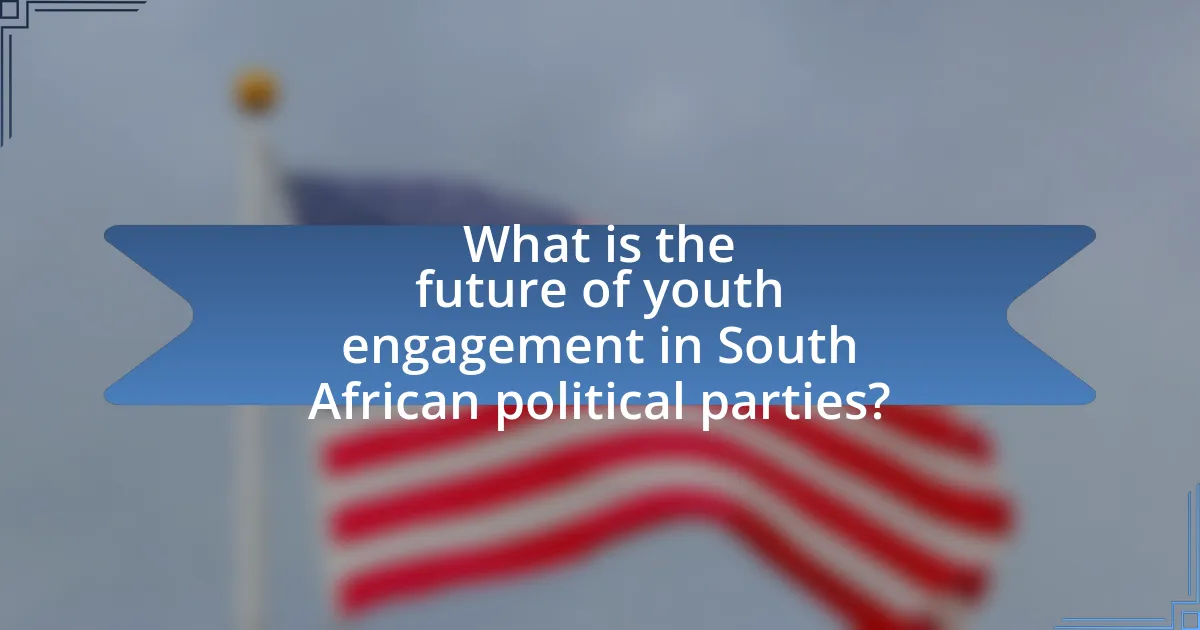
What is the future of youth engagement in South African political parties?
The future of youth engagement in South African political parties is likely to be characterized by increased digital activism and a demand for accountability. As young South Africans become more tech-savvy, they are utilizing social media platforms to mobilize, express their views, and influence political discourse. According to a 2021 study by the Institute for Justice and Reconciliation, 70% of South African youth believe that social media is an effective tool for political engagement. This trend indicates that political parties will need to adapt their strategies to engage with younger voters effectively, focusing on transparency and responsiveness to the issues that matter to them, such as unemployment and education.
How can political parties improve their engagement with youth in the future?
Political parties can improve their engagement with youth by leveraging digital platforms and social media to create interactive and relatable content. Research indicates that 95% of South African youth use social media, making it an effective channel for outreach and communication. By utilizing platforms like Instagram, TikTok, and Twitter, parties can share their policies, engage in discussions, and address youth-specific issues in real-time. Additionally, incorporating youth voices in decision-making processes and policy formulation can foster a sense of ownership and relevance among young voters, as evidenced by studies showing that participatory approaches increase political interest and engagement among youth.
What innovative approaches could be adopted to enhance youth participation?
Innovative approaches to enhance youth participation include leveraging technology and social media platforms to create interactive engagement opportunities. For instance, political parties can utilize mobile applications and online forums to facilitate discussions, gather feedback, and promote civic education among young people. Research indicates that 90% of South African youth are active on social media, making it a vital tool for outreach and mobilization. Additionally, implementing mentorship programs that connect young individuals with experienced political leaders can foster a sense of belonging and encourage active involvement in political processes. These strategies not only increase accessibility but also empower youth by giving them a voice in shaping policies that affect their lives.
How can collaboration with youth organizations strengthen political engagement?
Collaboration with youth organizations can strengthen political engagement by providing a platform for young people to voice their concerns and influence policy decisions. This partnership fosters a sense of ownership among youth, encouraging them to participate actively in the political process. For instance, research by the Institute for Democracy in Africa highlights that youth-led initiatives have successfully mobilized thousands of young voters in South Africa, significantly increasing their participation in elections. By leveraging the networks and resources of youth organizations, political parties can better connect with younger demographics, ensuring that their policies reflect the interests and needs of this vital group.
What practical steps can young people take to engage with political parties?
Young people can engage with political parties by joining youth wings of these parties, participating in local meetings, and volunteering for campaigns. Joining youth wings allows young individuals to connect with like-minded peers and influence party policies. Participating in local meetings provides opportunities to voice concerns and contribute to discussions on issues that matter to them. Volunteering for campaigns not only helps in gaining practical experience but also strengthens the party’s outreach efforts. According to the Electoral Commission of South Africa, youth participation in political processes is crucial for a representative democracy, highlighting the importance of these steps for effective engagement.
How can youth leverage their influence in political discussions?
Youth can leverage their influence in political discussions by actively participating in political organizations, utilizing social media platforms for advocacy, and engaging in community initiatives. Active participation in political organizations allows youth to voice their opinions and contribute to policy-making processes, as seen in the rise of youth-led movements like #FeesMustFall in South Africa, which successfully influenced educational policy reforms. Utilizing social media enables youth to mobilize support, share information, and raise awareness on critical issues, exemplified by the significant role platforms like Twitter and Instagram played during the 2019 South African elections. Engaging in community initiatives fosters grassroots connections and demonstrates the impact of youth perspectives on local governance, thereby enhancing their credibility and influence in broader political discussions.
What resources are available for young people to get involved in politics?
Young people in South Africa can access various resources to get involved in politics, including youth wings of political parties, civic organizations, and educational programs. Political parties such as the African National Congress and the Democratic Alliance have dedicated youth structures that provide platforms for engagement, leadership training, and policy discussions. Additionally, organizations like the Youth Development Agency and the South African Youth Council offer programs aimed at empowering young individuals to participate in political processes. Educational institutions also play a role by hosting debates, workshops, and seminars focused on political literacy and civic engagement, fostering a more informed youth ready to engage in the political landscape.
